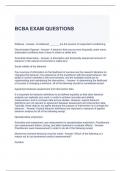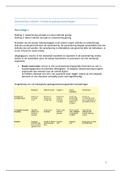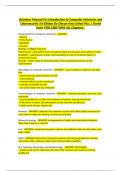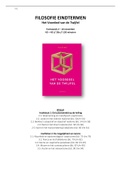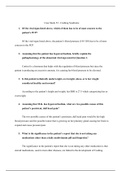Addiction AQA A Level 16 Mark Model Answer
01 Fifteen-year-old Jenny has recently started smoking. She believes that smoking will stop her
putting on weight and help her to cope with stress. Most of her friend’s smoke and she thinks that
smoking helps her to fit in with the group of popular girls, whom she sees as fun-loving and cool.
Using your knowledge of vulnerability to addiction, discuss some of the vulnerability factors that
contribute to Jenny’s smoking. Refer to relevant research in your answer. (16)
One vulnerability factor for developing an addiction is stress. Epstein et al (1999) studied women
who had PTSD due to childhood rape. He found that these women were way more likely to develop
an addiction in comparison to those who didn’t suffer from stress related trauma. This shows that
stress can have an effect on one’s susceptibility to an addiction making these things correlated.
Jenny experiences stress due to her weight gain. She believes smoking will help her to stop gain
weight, thus deceiving her into believing she can self-medicate her weight gain. Jenny will continue
smoking to medicate her weight gain causing her to become dependent to cigarettes making her
likely to get addicted.
Another risk factor is peer influence. Mary O’Connell suggested there are 3 major elements that
contribute into peer influences role on addictions. As a teen, its likely for any teen to come across or
become friends with people who smoke. In a social event, the group may all be smoking besides the
at risk teen which puts them in a situation where they don’t “fit in”. In order to fit in the teen will
have to imitate this behaviour and may overestimate the amount that has to be smoked. This will
cause the teen to quickly become addicted. In Jenny’s case, her friends fit in with the popular girls
who smoke, meaning Jenny is the outlier. As smoking is the norm amongst these girls, Jenny is led to
believe smoking is the key to being accepted into this cool popular group. Eventually when the
opportunity presents itself Jenny will smoke with her friends and the popular groups, increasing her
vulnerability of developing a smoking addiction.
One evaluation of risk factors is that some of the research is correlational and not based on direct
causations. Epstein’s research successfully correlated stress with vulnerability to develop addictions
however he failed to establish any real causations. This means it can be argued that the addictions
cause stress not the other way around due to the way that addictions affect our lifestyle and
relationships. Therefore, because risk factors and addictions correlate it is difficult to establish a
cause and effect relationship as it's unclear which factor causes the other.
Another evaluation of risk factors is that having interaction of all factors is more impactful than each
individual factor. Linda Mays and Nancy Suchman point out that different mixes of risk factors can
determine the severity of addiction. Some risk factors like peers and family influences may actually
protect the individual through strict parenting or well behaved peers meaning other factors like
genetic vulnerability may be more appropriate. Therefore, assuming that these risk factors are the
only factors that could help develop addiction is a very reductionist approach as there are other
ways in addiction could form and one factor causing addiction is highly simplistic in its nature.
One evaluation is that the research has a lot of methodological flaws. Griffiths research into family
influences highly flawed, it uses a method of introspection which requires self-report. This could
create biased information about any incidents of stress and trauma. This is an issue as it's not
scientific, self-report methods are likely to generate methodological flaws as it's subject to bias
participants made lie about the answers. This brings us to question the validity of this research and
the family influence explanation.
01 Fifteen-year-old Jenny has recently started smoking. She believes that smoking will stop her
putting on weight and help her to cope with stress. Most of her friend’s smoke and she thinks that
smoking helps her to fit in with the group of popular girls, whom she sees as fun-loving and cool.
Using your knowledge of vulnerability to addiction, discuss some of the vulnerability factors that
contribute to Jenny’s smoking. Refer to relevant research in your answer. (16)
One vulnerability factor for developing an addiction is stress. Epstein et al (1999) studied women
who had PTSD due to childhood rape. He found that these women were way more likely to develop
an addiction in comparison to those who didn’t suffer from stress related trauma. This shows that
stress can have an effect on one’s susceptibility to an addiction making these things correlated.
Jenny experiences stress due to her weight gain. She believes smoking will help her to stop gain
weight, thus deceiving her into believing she can self-medicate her weight gain. Jenny will continue
smoking to medicate her weight gain causing her to become dependent to cigarettes making her
likely to get addicted.
Another risk factor is peer influence. Mary O’Connell suggested there are 3 major elements that
contribute into peer influences role on addictions. As a teen, its likely for any teen to come across or
become friends with people who smoke. In a social event, the group may all be smoking besides the
at risk teen which puts them in a situation where they don’t “fit in”. In order to fit in the teen will
have to imitate this behaviour and may overestimate the amount that has to be smoked. This will
cause the teen to quickly become addicted. In Jenny’s case, her friends fit in with the popular girls
who smoke, meaning Jenny is the outlier. As smoking is the norm amongst these girls, Jenny is led to
believe smoking is the key to being accepted into this cool popular group. Eventually when the
opportunity presents itself Jenny will smoke with her friends and the popular groups, increasing her
vulnerability of developing a smoking addiction.
One evaluation of risk factors is that some of the research is correlational and not based on direct
causations. Epstein’s research successfully correlated stress with vulnerability to develop addictions
however he failed to establish any real causations. This means it can be argued that the addictions
cause stress not the other way around due to the way that addictions affect our lifestyle and
relationships. Therefore, because risk factors and addictions correlate it is difficult to establish a
cause and effect relationship as it's unclear which factor causes the other.
Another evaluation of risk factors is that having interaction of all factors is more impactful than each
individual factor. Linda Mays and Nancy Suchman point out that different mixes of risk factors can
determine the severity of addiction. Some risk factors like peers and family influences may actually
protect the individual through strict parenting or well behaved peers meaning other factors like
genetic vulnerability may be more appropriate. Therefore, assuming that these risk factors are the
only factors that could help develop addiction is a very reductionist approach as there are other
ways in addiction could form and one factor causing addiction is highly simplistic in its nature.
One evaluation is that the research has a lot of methodological flaws. Griffiths research into family
influences highly flawed, it uses a method of introspection which requires self-report. This could
create biased information about any incidents of stress and trauma. This is an issue as it's not
scientific, self-report methods are likely to generate methodological flaws as it's subject to bias
participants made lie about the answers. This brings us to question the validity of this research and
the family influence explanation.

